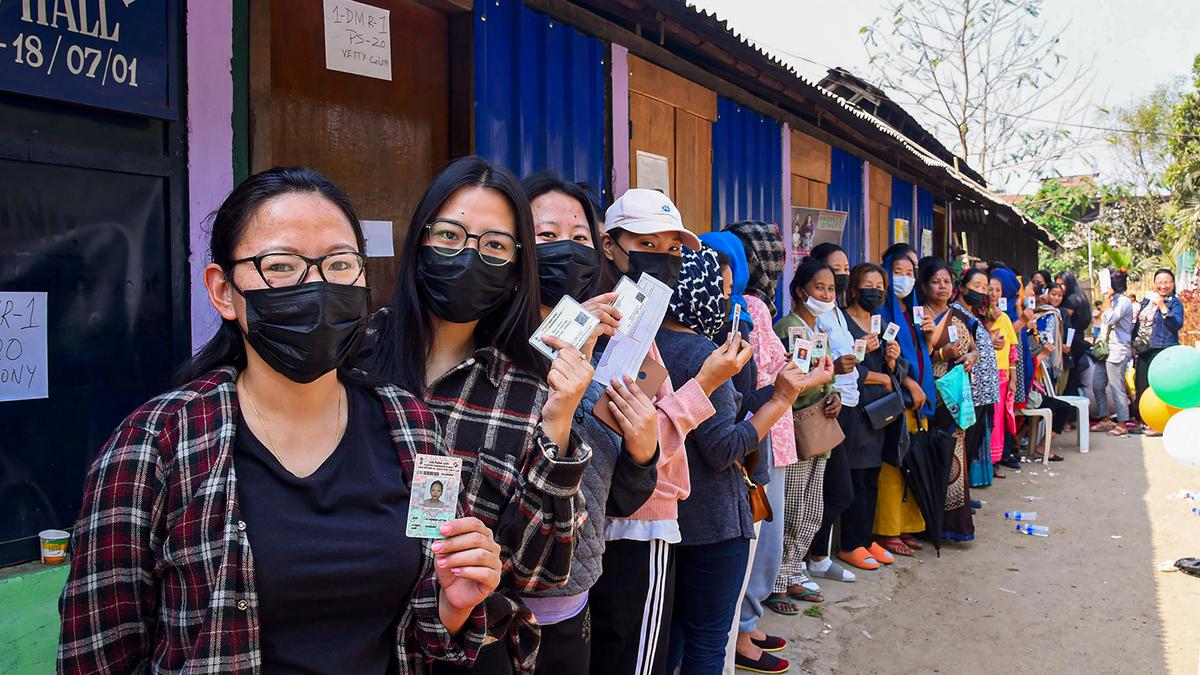Voters standing in a queue show their ID cards before casting their votes. File
| Photo Credit: –
After 20 years of resistance to the reservation of seats for women, Nagaland will vote for the urban local bodies (ULBs) on Wednesday.
Of the 16 districts in the State, the civic polls will be held in 10 because of the non-participation of the communities in six eastern districts where the Eastern Nagaland People’s Organisation (ENPO) exercises its clout.
Nagaland has three municipal councils – Dimapur, Kohima, and Mokokchung – and 36 town councils. Six of the 19 wards in Kohima, eight out of 23 wards in Dimapur, and six out of 18 wards in Mokokchung have been reserved for women.
State Election Commission officials said 64 candidates were elected unopposed while the fate of 253 will be decided by the voters on June 26. The ruling Nationalist Democratic Progressive Party (NDPP) had the most candidates (45) winning unopposed followed by its ally Bharatiya Janata Party with seven, the Nationalist Congress Party with five, Congress with three, and the Naga People’s Front and independents with two each.
NDPP-BJP rift
The run-up to the civic polls exposed the cracks in the partnership between the NDPP and the BJP. The two parties fielded candidates against each other without any seat-sharing agreement as was the case during the 2023 Assembly election.
The NDPP blamed the BJP for failing to retain the lone Nagaland Lok Sabha seat while the BJP said the NDPP should have been grateful for helping it form the government in 2018 despite finishing 13 seats short of the majority mark.
Church appeal
The Nagaland Baptist Church Council (NBCC) called for “one person, one vote” and “vote without influence” in Wednesday’s ULB election. The appeal is believed to be against the issue of proxy voting that has troubled Nagaland for long.
“In this coming ULB election, let us exercise our franchise with dignity and pride to choose the right leader to represent us in our ward for the benefit of the community,” it said in an appeal to the voters.
The NBCC said the voters have a responsibility to pray before casting their votes to pick whoever they believe would do the best job for their ward or colony.
A few candidates had filed their nominations in the six eastern districts despite the ENPO’s call against participation. All withdrew their candidature later to stand in solidarity with the ENPO’s demand for the creation of Frontier Nagaland Territory, a self-rule zone.
The ENPO and people across the six districts stayed away from the Lok Sabha election on April 19 for the same reason.
The Nagaland Municipal and Town Council Act was passed in 2001 without the provision of reserving 33% of the seats for women, as required under Article 243T of the Constitution. This was amended in 2006.
The first election under the Act was conducted in 2004 without the reservation of seats for women, except in Mokokchung, as it was deemed to undermine the special provisions granted to Nagaland under Article 371A of the Constitution.
Efforts to hold the ULB polls with a 33% quota for women after 2004 met with resistance from social and apex tribal groups. The decision to hold the election in 2017 triggered violent protests, claiming two lives while government properties were damaged across the State.
The 60-member State Assembly passed the Nagaland Municipal Act of 2023 on November 9 last year, following which the Supreme Court directed the State government to complete the electoral process for the ULBs by April.
The ULB poll has been billed “historic” after the election of the first woman to the Rajya Sabha from Nagaland in 2022 and election of two women as MLAs in the Assembly in 2023.






